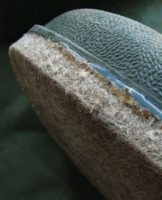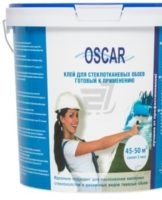Properties and purpose of Litokol glue, an overview of popular brands and how to use it
Some people have to deal with wall tiles. Before starting such work, it is necessary to select a suitable adhesive liquid with which the material will be laid. Litokol glue is suitable for such work. Before using the product, you should familiarize yourself with its application features and functionality.
Properties and purpose of the main varieties of Litokol glue
People who are going to use this adhesive mixture should understand the purpose and properties of its main varieties.
Dispersive
Some people use ready-to-use dispersion formulations. They are made on the basis of special synthetic resins, which are painted white.Characteristics of dispersion mixtures include a high level of adhesion, as well as resistance to high and low temperatures. The glue does not lose its properties even at temperatures above 90 degrees Celsius.
Cement tile
For laying tiles, a special cement composition is often used, which is especially reliable. The cement composition is produced in the form of a gray powder based on high-quality Portland cement. Also, organic components and inert fillers are added to the composition. The advantages of glue include a high level of adhesion and versatility.
Reagent
It is a two-component white adhesive that is made without the addition of solvents and water. Among the advantages of reactive mixtures are their water resistance, as well as a high level of elasticity.
When creating such a glue, special organic microelements with fine-grained fillers are used.
Elastic
This is a dark colored dry adhesive made from Portland cement. Also, when creating elastic adhesives, inert fillers are used. Use an elastic adhesive for interior and exterior tiling. Ideal for laying ceramic tiles or artificial stone.
Review of popular brands
There are eighteen well-known brands of Litokol glue, the peculiarities of which should be understood before using them.
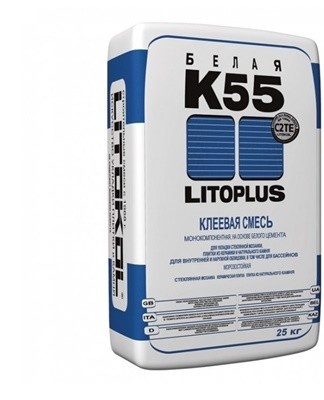
X11
Such an adhesive mixture is made from reinforced Portland cement, to which cellulosic essential substances are added. Quartz sand is also added during manufacturing, which is used as aggregate. Before use, X11 will need to be mixed with water to prepare a working solution. Glue benefits include:
- increased grip level;
- reliability;
- ease of use;
- elasticity.
K80
Dry glue based on cement and organic additives. K80 is used when laying ceramic tiles on a floor or on walls. This adhesive can be used on plasterboard, concrete, wood, plaster or gypsum surfaces.
"Superflex k77"
This composition, like most other Litokol brands, is made from reliable Portland cement. "Superflex k77" is produced in the form of a grayish powder, which must be mixed with water before use to obtain a working mixture.
"Superflex k77" has the following advantages:
- high level of elasticity, due to which it is not necessary to add latex;
- adhesion to most substrates;
- a large number of organic components;
- water resistance.
"Litoflor k66"
It is a versatile adhesive that is most often used for laying ceramic floor tiles. A feature of the K66 brand is that it is suitable for most surfaces. It can be used to fix tiles on brick, plasterboard, cement and aerated concrete bases. Among the advantages are resistance to frost and high humidity.
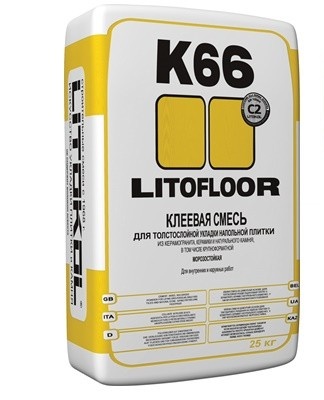
K55v
It is made on the basis of dry white cement, which makes the adhesive mixture more reliable. A distinctive feature of the K55v is that after use, a lightweight substrate is created under the surface of the tile, which holds it.
K98 / K99
People who want to use fast-setting agents can use the K98 / K99 brand. These cement mixes have improved technical characteristics and can therefore be used both outdoors and indoors.
Suitable for bonding tiles to cement screeds, plasterboard or concrete substrates.
K81
Powder assembly tool, which must be diluted with water before use.Such a composition is specially designed for laying ceramic plates. The K81 is versatile enough to be used indoors and outdoors. The adhesive bonds reliably to plaster, concrete and brick substrates.
K47
An effective powder adhesive made from the gray type of Portland cement. Before using K47, it is pre-mixed with water. The result is a mixture that is distinguished by reliable adhesion of glued surfaces, ease of use and efficiency.
BETONKOL K9
It is a reliable adhesive, in the manufacture of which components of lime and white cement are added. BETONKOL K9 is available in powder form and must therefore be mixed with water beforehand. The adhesive solution has high adhesion, strength and resistance to temperature changes.
LITOFLEX K80 ECO
Dry powder mixture composed of chemical additives and synthetic resins. When mixing powder with water, an elastic adhesive mixture is obtained, with which you can glue porcelain stoneware tiles. The characteristics of the composition allow it to be used for both interior and exterior works.
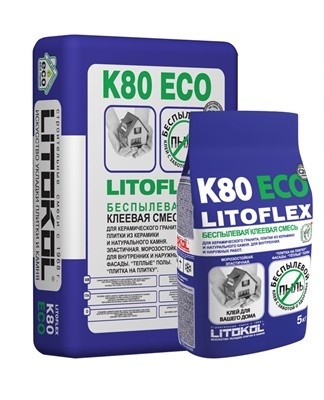
LITOFLEX K80 White
White K80 is often used to bond ceramic tiles to the surface. The solution prepared from this powder is easy to use and water resistant. K80 is quite elastic and does not lose its properties even at low or high temperatures.
BETONKOL K7
Powder mix based on gray cement powder, lime fillers and organic additives. BETONKOL K7 should be mixed with a little water to form an adhesive mixture that is easy to apply. The prepared solution is perfectly applied to both horizontal and vertical surfaces.
LITOLIGHT K16
An effective cementitious compound that has improved technical characteristics and is often used in the construction industry. LITOLIGHT K16 is used for laying clinker, ceramic or decorative stone tiles. It is used for coating walls and floors.
HYPERFLEX K100
Such a composition is made from durable Portland cement, which is able to reliably glue surfaces. HYPERFLEX K100 consists of organic additives and inert fillers which make the adhesive more elastic. They use the product to lay the tiles on the walls or the floor.
HYPERFLEX K100 is water resistant and therefore often used for pool lining.
LITOGRES K44 ECO
A dry adhesive mix with a high level of adhesion. LITOGRES K44 ECO is suitable for bonding on ceramic tiles and granite surfaces. The product has a low resistance to temperature changes and is therefore only used indoors.
LITOACRIL PLUS
This composition, unlike many others, is made from an aqueous emulsion with organic additives. LITOACRIL PLUS is used for laying ceramic tiles on the floor. Experts recommend using this glue only indoors, as it is not suitable for outdoor use.
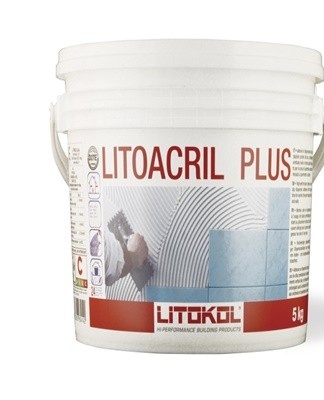
LITOACRIL FIX
A basic dispersion-type adhesive based on synthetic components. When creating LITOACRIL FIX, organic additives and fillers are also used. Such an adhesive is used for gluing mosaics or ceramic tiles on the floor. Compatible with concrete, brick and plaster surfaces.
LITOELASTIC
The main feature of this glue is that it does not use solvents with water. Instead, synthetic resins and organic catalysts are added to LITOELASTIC.Due to this, the adhesive mixture is resistant to water and temperature extremes.
How to choose and calculate your consumption
Before using Litokol, you should familiarize yourself with the specifics of choosing an adhesive for different rooms.
Hallway, hallway or kitchen
In kitchens, hallways and corridors, the coating is often made with terracotta tiles. To attach such material to the bases, it is recommended to use the brand K47. It is ideal for bonding these tiles to concrete, plaster or brick surfaces.
Bathroom or swimming pool
The swimming pool and the bathroom are considered humid places. In such places, it is recommended to use waterproof compounds that would not lose their properties at high humidity. Litokol Plus is considered an ideal means for bonding plates, which is resistant not only to moisture, but also to the effects of a chemical environment.
Interior wall covering
In order to carry out the facing of the walls inside the premises, it is necessary to use the brands of glue K66 and K80. These products are ideal for bonding porcelain stoneware to surfaces. Such adhesive mixtures have thixo-stop properties, due to which the tile does not slip until the mortar has completely solidified.
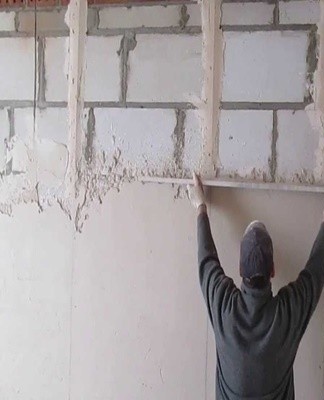
For exterior, veranda and exterior walls
On the street, it is better to use special adhesives that can withstand temperature changes and high humidity. A suitable outdoor tool is X11, which is suitable for wall cladding.
Stairs and parts with heavy loads
Sometimes it is necessary to lay tiles on steps subject to increased stress.For facing the stairs, you need to use the K77 mixture, which has high elasticity, strength and adhesion. Such a composition is protected from extremes of humidity and temperature.
How to do the job
Before using Litokol, you should familiarize yourself with its correct use.
Base preparation
First of all, it is necessary to carry out preliminary preparation of the bases. To do this, the surface to be treated is first cleaned of dirt, washed and degreased. This is done so that the applied adhesive adheres better to the coating.
Applying glue
When the base is ready, you can start applying the product. It is evenly distributed over the coating in a thin layer. Then, 2-3 minutes after application, the adhesive material is applied to the treated surface.
Additional tips and tricks
There are several recommendations that should be addressed before using the glue:
- the adhesive solution should be applied to the prepared surface;
- you can not apply a lot of glue, as this will worsen the adhesion;
- when using "Litokol" it is necessary to periodically ventilate the room.
Conclusion
Litokol is considered a popular glue used for wall cladding. Before using the mixture, it is necessary to familiarize yourself with known brands, as well as about the use of such an adhesive.

